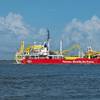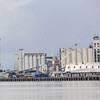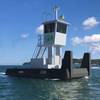Höegh Fleet Services A/S was sentenced to pay a $3.5 million fine for seven felony charges relating to the falsification of records concealing the intentional dumping of waste oil into the ocean. Previously, on September 25, 2003, Vincent Genovana, an engineering officer on the M/V Höegh Minerva, pleaded guilty to falsifying documents and covering up evidence in order to obstruct or influence a U.S. Coast Guard investigation.
In addition to the fine, U.S. District Court Judge Ronald B. Leighton ordered Höegh Fleet Services A/S to develop and implement a comprehensive environmental compliance plan for its fleet of 38 vessels that call on U.S. ports, and serve four years on probation. A significant part of the criminal fine, $1.6 million, will be used to fund environmental projects that benefit, preserve and restore ecosystems adjoining the coastlines of Washington and California.
The illegal operation came to light via a crew member aboard the M/V Höegh Minerva who blew the whistle, leading to the discovery of the bypass pipe by state and federal inspectors. Judge Leighton granted the U.S.’ request that the crew member receive a $300,000 whistleblower award.
M/V Höegh Minerva possessed equipment to properly handle its waste oil, including an oil water separator to process oily water that collects in the lowermost compartments of the ship. According to the plea agreement and other court records: Genovana directed another crew member on board Höegh Minerva to fabricate a bypass pipe that was fitted into the existing vessel piping system for the oil water separator to allow crew members to pump inadequately treated oil contaminated waste water directly overboard into the ocean. Crew members referred to the pipe as the "magic pipe." The magic pipe was initially installed in June 2003 while the vessel sailed between Canada and Asia. It remained installed for several days at a time, allowing crew members to bypass the ship's pollution prevention equipment. None of the discharges were recorded in the Oil Record Book as required by international and U.S. law. Instead, crew members knowingly made false and fraudulent entries and omissions in the Oil Record Book in an effort to conceal the illegal discharges from U.S. Coast Guard inspectors.
The magic pipe was removed several days before Höegh Minerva arrived at the Port of Los Angeles on September 2, 2003. Following its removal, crew members painted the fittings where the magic pipe had been installed in an effort to conceal the prior use of the fittings. U.S. Coast Guard officials boarded the vessel at the Port of Los Angeles and, several days later, in Richmond, Calif. At both ports, ships officers failed to inform Coast Guard officials of the illegal dumping. Moreover, in Richmond, crew members presented Coast Guard inspectors with the falsified Oil Record Book. On September 11, 2003, the falsified Oil Record Book was again presented to U.S. Coast Guard inspectors at the Port of Vancouver, Wash. The illegal dumping onboard the ship came to light after a whistle-blower on board the ship secretly passed a note to Coast Guard inspectors describing the illegal activity. An investigation in Vancouver prompted by the whistle-blower note led to the discovery of the magic pipe.
Genovana cooperated with the government. As a result, he was sentenced in U.S. District Court in Tacoma to a 30-day term in custody, followed by two years of supervised release.
Featured videos

Inmarsat Enhances Service to Drive Digitalization

Tracking Foreign Vessels Working in the U.S. Jones Act Market

Inside the Electrified Truckable Tug
Subscribe for
Maritime Reporter E-News
Maritime Reporter E-News is the maritime industry's largest circulation and most authoritative ENews Service, delivered to your Email five times per week









